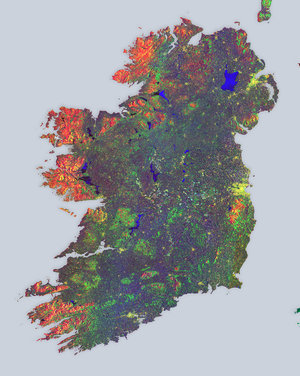Job creation and growth with space
Ireland is setting an example for how space technologies can contribute to economic growth and recovery through the maritime sector. Over 100 European specialists in policy, space technology, industry and maritime interests met this week on the Emerald Isle to learn more.
Satellites can support the development of our seas and oceans in areas such as aquaculture, renewable energy, resource extraction, fisheries protection and tourism.
With ESA’s help, Irish companies and researchers are developing innovative maritime services using satellite-derived data in these areas, providing an opportunity for growth and employment in addition to contributing to numerous socio-economic activities.
“Data from satellites help identify how our oceans are used and there is a very strong demand from the marine community and operational agencies for this type of information,” said Volker Liebig, Director of ESA’s Earth Observation Programmes and keynote speaker at the Space Innovation Powering Blue Growth conference.
“For example, oil spills and pollution know no borders, use of and access to shipping routes is becoming increasingly complex, and illegal activities require robust maritime surveillance capabilities.”

Outlining opportunities for Ireland in particular, Prof. Liebig pointed to the country’s extensive maritime area: “This national asset is a largely untapped source of many new business opportunities for Irish SMEs (small- and medium-sized enterprises).”
Ireland’s Minister of State for Research and Innovation, Seán Sherlock, was also at the opening of the conference to highlight that support for research and innovation in Irish companies is a priority for the government.
“Collaborating closely with the European Space Agency through various programmes such as Earth observation, satellite navigation and telecommunications, along with the European Commission through the Seventh EU Framework Programme, FP7, is an integral part of driving innovation and research in Ireland.”
He went on to note how Ireland’s membership to ESA is having a positive effect on the research and SME community. Through their involvement in ESA and FP7 programmes, Irish companies and research institutes, “Are directly addressing global challenges such as climate change, sea-level rise, maritime surveillance, flooding and marine environmental monitoring.”
There are currently over 40 Irish companies and research institutes working with ESA, generating more than €10 million in contracts every year.
“The level of spin-off export sales from Irish investment in ESA is estimated at €35 million per annum and is projected to grow substantially as the number of Irish companies securing ESA contracts continues to expand,” said Barry Fennell from Enterprise Ireland.

Ireland’s membership of ESA is funded by the Irish Government and coordinated by Enterprise Ireland, enabling Irish companies and research institutes to participate in ESA programmes and secure valuable contracts for technology developments that can be commercially exploited.
“Ireland’s investment in ESA is assisting Irish technology companies in supporting technology innovation, leading to export sales and increased employment,” said Ireland’s Minister for Agriculture, Food and the Marine, Simon Coveney.
“This is a competitive and growing industry, one which will guarantee high-quality jobs for Irish people and assist our economy into the future.”
The conference, an associated event of the Irish Presidency of the Council of the EU, was jointly organised by ESA, Enterprise Ireland, the Coastal and Marine Research Centre (University College Cork), the Irish Coast Guard, the Irish Naval Service and the DG Maritime Affairs of the European Commission.















 Germany
Germany
 Austria
Austria
 Belgium
Belgium
 Denmark
Denmark
 Spain
Spain
 Estonia
Estonia
 Finland
Finland
 France
France
 Greece
Greece
 Hungary
Hungary
 Ireland
Ireland
 Italy
Italy
 Luxembourg
Luxembourg
 Norway
Norway
 The Netherlands
The Netherlands
 Poland
Poland
 Portugal
Portugal
 Czechia
Czechia
 Romania
Romania
 United Kingdom
United Kingdom
 Slovenia
Slovenia
 Sweden
Sweden
 Switzerland
Switzerland


























